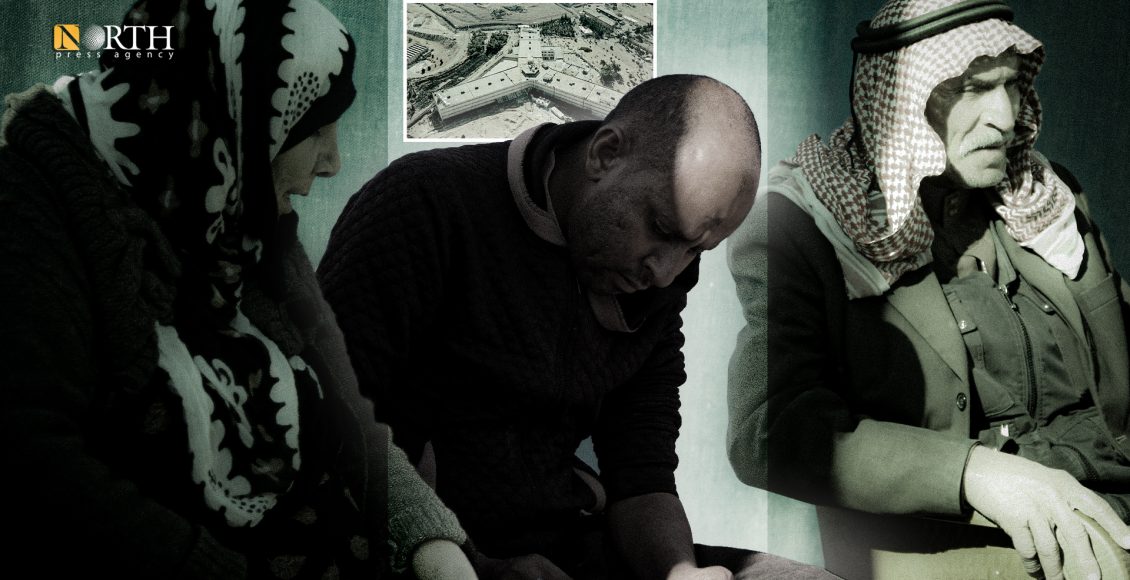By Dilsoz Youssef
HASAKAH, Syria (North Press) – In Washokani camp for displaced persons in the countryside of Hasakah, northeastern Syria, Omar Bazo, 33, sits on a chair beside his parents after returning from Saydnaya Prison, suffering from memory loss and severe mental health challenges.
Under the sunlight that Omar had not seen since his imprisonment years ago, his mother sits beside him, revealing scars on his legs. She says, “These are the marks of beatings and torture. One of his hands was broken when we found him, but it has since healed.”
Saydnaya Prison, established in the 1980s, was described by Amnesty International as a human slaughterhouse, where the Syrian state quietly “slaughters its own people.”
Omar’s arrest
A video capturing Omar’s family reunion with him in a Damascus hospital went viral on social media, drawing widespread reactions. This occurred after Hayat Tahrir al-Sham (HTS) seized the prison and transferred detainees to hospitals.
According to his family, Omar’s arrest dates back to 2018 when they lost contact with him during his seventh year of reserve military service in the former regime’s forces.
Omar, who had been stationed in Eastern Ghouta, informed his family a week before his disappearance that he was due to be discharged in March 2018. His superiors had promised that the Ghouta offensive would be their last operation before they returned home.
Following the regime’s takeover of Ghouta, a key opposition stronghold near Damascus, under a deal brokered by Russia, Omar disappeared without a trace.
Deception
Sitting beside Omar, his father, Hassan Bazo, recounts his relentless search for his son.
“I searched everywhere, even though they kept telling me he was dead. But I never believed them.”
During his search, Bazo spent large sums of money on bribes to lawyers and officers who promised to reunite him with his son. He later realized these were all deceptions.
The family’s hope was briefly revived when, in late 2023, the ousted Syrian president Bashar al-Assad announced a general amnesty. Omar’s photo appeared on pro-regime media, listed among those granted amnesty.
“I went to Damascus and saw my son in Saydnaya. We even took pictures together,” Bazo said. “At that time, he was not in this state, and his memory had not deteriorated so severely.”
However, their joy was short-lived, as Omar was soon hidden again, and they lost contact with him once more. This continued until his release following the prison’s capture by HTS.
Broken
“My son has changed,” Bazo laments. “He’s now mentally incapacitated. Doctors recommend psychological treatment alongside care.”
Omar’s story is not unique. Social media platforms have been flooded with stories of other detainees released in a state of severe psychological and physical distress, some suffering from memory loss or cognitive impairment due to years of relentless torture.
Omar remains unaware that his family now lives in a displacement camp after Turkish forces and affiliated armed factions, aka the Syrian National Army (SNA) seized their village, Tel Atash, near the city of Sere Kaniye (Ras al-Ain), in late 2019.
His family, who has stayed by his side since his release, describes his psychological instability. “At night, we sleep huddled together to prevent him from unintentionally hurting himself,” Omar’s brother shares.
Death certificate
Despite having received a death certificate for Omar during his disappearance, his 70-year-old mother, Yazi al-Nasser, never stopped believing he was alive.
Sitting to Omar’s left, she recalls her relentless search for him. “I never stopped looking for him. I left my home, my other children, and everything behind, searching for my missing son.”
When they found him in the hospital, his condition was heartbreaking. Although his health has slightly improved, she says, “He prefers staying in the sun, does not eat much, and dislikes staying indoors. The doctors advised us to continue his psychological treatment and ensure he receives proper nutrition.”
Despite the joy of reuniting with her son, Yazi grieves the state he’s in. “He was once mentally strong, but now, he has lost that. It breaks my heart to see him like this.”
Human rights reports indicate that since 2011, thousands of detainees have been executed in Saydnaya Prison, many through secret mass hangings. Others died due to repeated torture, systematic deprivation of food, water, and medical care.

